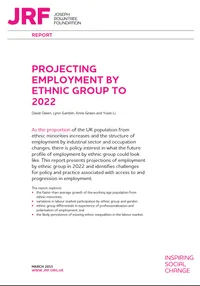Dr David Owen
Research interestsThese lie within the following broad areas:
Most of my work is quantitative and applied in nature. I have undertaken research for academic funding bodies including the Economic and Social Research Council and the Joseph Rowntree Foundation, and for a wide range of public sector bodies, notably the Department for Education, Construction Industry Training Board, NASUWT, Home Office, UK Commission for Employment and Skills, Department for Employment and Skills, and Department for Communities and Local Government. I have also collaborated with a number of consultancy companies on research for public and private sector clients. Currently (February 2020), I am involved in three key research areas in the IER. The first is the Working Futures projections of the labour market. I have contributed to all the recent Working Futures projections, most recently the seventh set of projections covering the period from 2017 to 2027. I have been responsible for the spatial aspects of Working Futures, writing the "regional annex" presenting the projections for the nations and regions of the UK. I also manage the 'portal' which makes projections for smaller geographical areas available to users. The second is the LMI for All project, for which I am a member of the data team. I have responsibility for a number of data sets within the database (e.g. vacancies and Census data), geographical coding and apprenticeship information.. The third is research into the labour market integration of armed forces veterans in the UK, funded by the Forces in Mind Trust. This has included a research project concerned with veterans' experience of self-employment and the second was concerned with the labour market experience of senior NCOs after leaving the armed forces. Further research will investigate the longer-term experiences of veterans in the labour market. In both projects thus far, I have been involved in the design of an online survey, the analysis of the data from the web survey and for identifying and analysing data on veterans from other statistical sources such as the ONS Annual Population Survey. The fourth is concerned with differentials in teacher earnings and progression for the National Association of Schoolmasters and Union of Women Teachers (NASUWT). In 2016, this study of earnings differentials and salary progression among teachers in EnglandLink opens in a new window published three reports. The project, funded by NASUWT, aimed to identify whether certain sections of the teaching workforce were disadvantaged by the new pay arrangements imposed from 2013. This draws upon the School Workforce Census in England, but also involves a large web survey and qualitative interviews. NASUWT has funded further research into pay differentials over the period since 2010 using individual data from the SWC in England and exploratory research on teacher pay in Wales. The outputs of this research feed into the union's campaigning activities and the implications of emerging ternds in the organisation of schools for the earnings and progression of different types of teacher in England forms the ongoing focus of this research. I have also worked with IFF Research and Anne Green olf City-REDI, University of Birmingham on a series of projects funded by the Construction Industry Training Board concerned with migrant workers in the UK construction industry. The projects presented profiles of migrant workers in 2017, 2018 and 2019. They used the same methodology: a review of recent research and policy literature, questionnaire surveys of workers and interviews with employers and analysis of the Labour Force Survey. I was responsible for the third of these. In 2016, I was involved in another major research project in the area of education. This project (led by CFE Research) was a questionnaire survey of teacher workloadLink opens in a new window (for the Department for Education). The IER (Nick Sofroniou, Daria Luchinskaya and myself) collaborated on research design and led on analysis of the survey data. The Teacher Workload Survey 2016 was intended to extend the findings of the series of teacher workload diary surveys conducted annually from 2005 to 2010 and in 2013, but to also develop a new survey which would be undertaken every two years and integrated with the OECD TALIS survey. The findings of the project were publishedLink opens in a new window on February 24th 2017 by the Department for Education in the form of a Research Report, Research Briefing and Technical Report. Other notable research projects which I was involved with include:
Whilst working at the Centre for Research in Ethnic RelationsLink opens in a new window, I led a number of significant research projects. These included "Minority Ethnic Participation and Achievements in Education, Training and the Labour market" (1999-00); "The Use of and Attitudes Towards Information and Communications Technologies (ICT) by People from Black and Minority Ethnic Groups Living in Deprived Areas" (2002-3) (both funded by the Department for Education and Skills [DfES]) and a "Review of the Evidence Base on Faith Communities" (2005-6) (for the Department for Communities and Local Government). I also directed a series of research projects for the Home Office, concerned with asylum policy, community cohesion and migrant integration. I also obtained ESRC grants to study patterns of population change, migration and commuting for minority ethnic groups in Great Britain. |
|
Academic profileWith a background in Geography, David Owen's research is largely concerned with demographic and labour market change and its spatial expression. Primarily a quantitative researcher, he specialises in the analysis of large secondary data sets (e.g. the UK Census of Population and Labour Force Survey), but has also led research projects involving a mixture of quantitative and qualitative approaches. He has particular interests in the spatial analysis of socio-economic data, the application of Geographical Information Systems and computer cartography. Before coming to Warwick, he worked in research posts at Durham (Geography), Newcastle (CURDS) and Cardiff (City and Regional Planning) Universities. He developed the pilot version of the NOMIS labour market information system while at Durham, contributed to the BBC Domesday system and the definition of travel-to-work areas while at Newcastle and was part of the Wales and South West Regional Research Laboratory while at Cardiff. In his first period at Warwick, he worked on the occupational and regional aspects of labour market projections. On returning to Warwick, he joined the Centre for Research in Ethnic Relations and undertook a great deal of quantitative research into the characteristics of minority ethnic groups in Great Britain. He was one of the first people to analyse data on ethnicity from the Census of Population and was very active in disseminating Census data beyond academia. You can access a series of reports on the 1991 Census here. He has an ongoing interest in labour market information systems and local labour market information. |
|
Current projects
All projects |
|
Selected publications
|
|
Doctoral supervisionI am currently (November 2025) co-supervising two PhD students. The first is Mohammed Awwal Abdullahi, an ESRC-funded student researching the return migration of Nigerian doctors in the UK (whose other supervisor is Gaby Atfield). He is currently revising the thesis he submitted in June 2025. Secondly, Poonam Panda is in the third year of a Chancellors' International Scholarship studying the role of self-efficacy in the career aspirations and work migration of women workers in India. Her other supervisor is Emily Erickson. A third student (Danya Nusseir) was awarded her PhD on the role of Information Technology in labour market participation by female Arab (Palestinian and Syrian) refugees in Jordan, Lebanon and the UK in April 2025. |
Principal Research Fellow
Institute for Employment Research
University of Warwick
Coventry CV4 7AL
Tel: +44(0)24 76524259
D dot W dot Owen at warwick dot ac dot uk
Projecting employment by ethnic group

We have recently produced projections of UK employment change by ethnic group for the period from 2012 to 2022, based on Working Futures 5 employment projections. For details, click on the project page, which contains a summary of the project and its findings.
Quantitative analysis of teachers' pay in England
Click here for a report on trends in teachers pay in England.
Analysis of the Census of Population
Analysis of the Census of Population is one of my other research interests.
See this page for various maps and data analyses, and links to Census data resources.
Click here for a conference paper using Census data to explore national identity in Britain.


